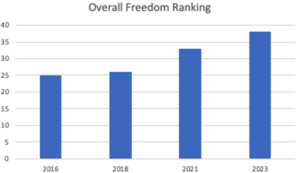How Nebraska ranks in freedom
The Cato Institute’s recent release of its new “Freedom in the 50 States” index should provide Nebraska policymakers with some good information to consider as they head into the 2024 legislative session. Cato is a national policy think tank focusing on individual liberty, limited government, and free markets.
The bottom line in the index: Nebraska’s overall rating of 38 (out of 50) puts Nebraska in the same neighborhood as Washington (37), Illinois (39), and Minnesota (41). Iowa is rated slightly better at 34, and Kansas is at 25. All our other neighboring states appear in the teens except for South Dakota (3) and Missouri (8).
The index is based on multiple dimensions within the broad spheres of Economic Freedom and Personal Freedom. The data used was based on laws in place in each state as of January 1, 2023 (which is how they have done their indexes for the previous years), and therefore does not consider any 2023 legislation.
All indexes like this represent data points for policymakers to consider. Healthy competition between the states improves the condition of the whole country over time, fulfilling Justice Louis Brandeis’ notion of the states being “laboratories of democracy,” where states try out different policies, and when they work, others follow suit. So, let’s look at Nebraska’s strengths and weaknesses in the Freedom Index as of a year ago.
Economic Freedom
Nebraska’s overall score in economic freedom is 34. The two main components of economic freedom are Fiscal Freedom (which includes State and Local Taxation, Government Consumption, Government Employment, Government Debt, and Cash and Security Assets) and Regulatory Freedom (which includes Land Use Freedom, Health Insurance Freedom, Labor Market Freedom, Lawsuit Freedom, Occupational Freedom, Miscellaneous Regulatory Freedom, and Cable and Telecom Freedom). These categories have stayed the same across the last four iterations of the index (2016, 2018, 2021, 2023), so I thought it might be interesting to see how things have changed over time. Remember that higher numbers are “worse”—1 is the best, and 50 is the worst.
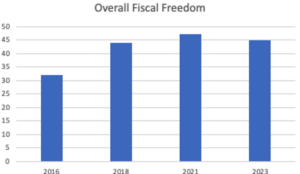
While one might expect significant tax reform occurring in the 2023 legislative session would improve our rankings, it’s important to remember also that nothing is static. If Nebraska is trying to improve its tax environment or reduce government consumption (we were rated 46 in that sub-category), other states will probably be doing that as well. Consistently working to improve and move policy in a beneficial direction is probably the key to consistently good ratings on these indexes.
The other component of economic freedom is Regulatory Freedom. In these areas, Nebraska has done very well over time—likely preventing our overall Fiscal Freedom numbers from hitting the bottom.
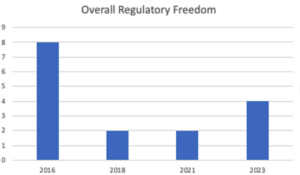
The Platte Institute has worked hard over the years to improve occupational freedom through our licensing reform efforts, and Nebraska is in a solid position at number 14 this year. However, our recent numbers have been on the decline. Nine states that rank above us on that portion of the index have already enacted Universal Recognition of out-of-state licenses—including all of our border states. The Nebraska Legislature can fix that with the enactment of LB16 in 2024, which is sitting on General File. The bill has broad bi-partisan support around the country and in Nebraska.
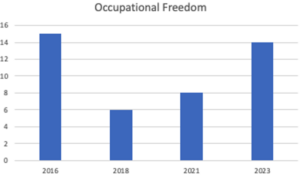
Combined, our Fiscal Freedom and Regulatory Freedom categories provide an overall Economic Freedom score of 34. Policymakers will want to keep an eye on that and consider ways of improving the economic freedom of individuals both through improved tax policy and reduced regulation.
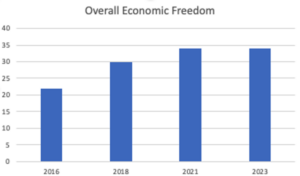
Personal Freedom
Turning to Personal Freedom, twelve elements feed into those scores. Nebraska’s overall ranking in this category is 40—higher than all states in our region except for Wyoming, which sits at number 48.
Categories included in personal freedom are: incarcerations and arrests; gambling freedom, gun rights, tobacco freedom, marriage freedom, educational freedom, cannabis freedom, alcohol freedom, asset forfeiture, travel freedom and campaign finance freedom.
The Platte Institute has not engaged in most of these areas of personal freedom—except for educational freedom and asset forfeiture—unless they’ve had a significant overlap with economic freedom.
By way of note, though, Nebraska sat at #40 in the gun rights category at the end of 2022, but one would assume that ranking would rise following the passage of LB77 and the establishment of a right to “constitutional concealed carry” in 2023.
Likewise, Nebraska was rated 47 in Educational Freedom in this index. Still, with the passage of LB753 this past spring, one could imagine that the numbers in that sub-category might improve marginally.
Personal Freedom scores have varied greatly over the last four indexes. Part of that is undoubtedly due to the more hesitant nature of Nebraskans when it comes to adopting reforms in areas like gambling, criminal justice and sentencing reform, and drug use reform. And, of course, being slow to the “constitutional carry” reform table and educational reform table has held us back as well, while other states have enacted those reforms.
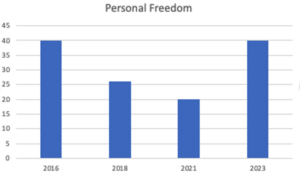
Overall Freedom Rating
Nebraska’s freedom rating has been dropping consistently since 2016 (again, higher is worse). No one expects Nebraska’s policymakers to enact sweeping changes in all the areas of policy freedom found in the Cato Index. But the document could be a good way for those who make the laws to consider two things: 1) how Nebraska looks in comparison to other states, and; 2) what effect those relative rankings have on the decisions of future generations to either stay in Nebraska, or come to Nebraska to work.
Cato analysis and policy recommendations for Nebraska can be found here.
